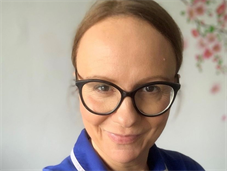No Smoking Day with King’s children’s respiratory CNS
10 March 2022 - Marking No Smoking Day with Mira Osinibi, children’s respiratory CNS nurse and smoking cessation advisor

Mira is a smoking cessation advisor at King’s College Hospital and a children’s respiratory clinical nurse specialist working in the Variety Children’s Hospital, caring for children with chronic lung disease such as asthma, non-cystic fibrosis bronchiectasis and interstitial lung disease. Mira said: “I am passionate about my role as a smoking cessation advisor, working in paediatrics. The service was first introduced in 2016 but has very quickly become an essential part of King’s.”
Can you tell us about the smoking cessation service that you offer in your department?
“The role of a smoking cessation advisor in paediatrics offers smoking cessation to parents/carers that currently smoke as it is absolutely imperative for the reduction of second-hand smoke exposure to the children. It is widely known that second-hand smoke exposure to children with asthma can cause an exacerbated asthma attack and either acute admission to hospital, or increased burden of their asthma treatment.
“Furthermore, tackling smoking cessation in young adolescents can reduce the high probability for adolescents to take up smoking in their adulthood and damage their health further.
“Since the start of our smoking cessation service at King’s, we have seen how the opportunity to seize the ‘teachable moment’ helps with providing the potential to motivate positive change in unhealthy behavior.”
What’s your role in the service?
“My role as a smoking cessation in paediatrics consists of seeing parents that currently smoke when their children have been reviewed by our clinician in a scheduled respiratory clinic.
“Smoking history is obtained and smoking cessation is offered to them and, if agreed, they are referred to me. My smoking cessation session starts with explaining the reasons for the referral and assuring that I am offering non-judgemental advice that is highly individualised to help them either stop/reduce smoking for the benefit of their health and their children.
“This style of talking about smoking cessation is more supportive than argumentative and it has helped with the success of the cessation participation as it allows parents who smoke to explore and change their habit.
“I also can offer to review carbon monoxide levels on the spot as this helps a smoker to have an instant visual result of the toxicity in their body from their current and past smoking habit.
What are some of your success stories?
“With the success of our outpatients smoking cessation to adults and adolescents, we have expanded it to our inpatient service and we are open to referrals from clinicians working on paediatric wards.
“We have also successfully reviewed many adolescent patients with other chronic diseases being admitted and started the journey of smoking cessation by prescribing NRT (Nicotine Replacement Therapy) and having a serious discussion about the harm of tobacco and cannabis.
“We now closely work with the KAOS team (King’s Adolescent Outreach Service) and they also refer vulnerable adolescents admitted into King’s that smoke either tobacco products or cannabis.
“To participate in the government plan of SMOKEFREE2030, all healthcare professionals have the responsibility to implement smoking cessation in their service in some form.”
